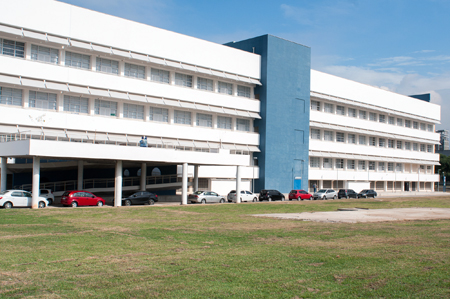Reafirmada a acreditação do Laboratório Brasileiro de Controle de Dopagem
LBCD realizará as análises dos Jogos Rio 2016
O Laboratório Brasileiro de Controle de Dopagem (LBCD) teve sua acreditação reafirmada para realizar análises de amostras de urina e sangue de atletas. A Agência Mundial Antidopagem (Wada) fez o anúncio nesta quarta-feira, 20 de julho, após avaliação técnica realizada nos dias 5, 6 e 7 deste mês.
Com a decisão, o LBCD segue os preparativos para realizar cerca de 6 mil análises durante os Jogos Olímpicos e Paralímpicos Rio 2016, marca superior à dos Jogos de Londres, em 2012. Nas últimas semanas, o preparo logístico do LBCD para as competições seguiu sem alterações. Assim, está garantida a recepção de 89 colaboradores internacionais. Em agosto, cerca de 300 profissionais trabalharão em três turnos, para garantir resultados em até 24 horas.
“A reafirmação do credenciamento do LBCD confirma a qualidade científica internacional da UFRJ, expressa o reconhecimento da ciência brasileira e assegurará tranquilidade aos atletas que treinaram de modo disciplinado para as competições”, afirmou o reitor da UFRJ, Roberto Leher.
O diretor do LBCD, professor Francisco Radler, destacou o desafio para a organização das equipes e procedimentos.“Tínhamos confiança de que a credibilidade científica da UFRJ seria mais uma vez reconhecida. Portanto, não alteramos o planejamento de trabalho, face ao enorme desafio logístico que se sobrepõe ao técnico-científico”, disse.
Com 5 mil metros quadrados de área útil, 85 equipamentos de grande porte e 200 máquinas auxiliares distribuídas em três andares, o LBCD repetirá a estratégia dos Jogos anteriores, recebendo diretores voluntários de outros laboratórios acreditados pela Wada. A vinda de especialistas de diversos países, somada à infraestrutura de ponta, fará do LBCD o laboratório mais moderno do mundo, durante os Jogos.
Fundado em 1989, o antigo Labdop foi rebatizado como LBCD em 2014, quando passou por intensa modernização, com apoio dos Ministérios do Esporte e da Educação. O LBCD pertence ao Instituto de Química da UFRJ, é um dos oito laboratórios que integram o Laboratório de Apoio ao Desenvolvimento Tecnológico (Ladetec), fundado em 1984. Foi o primeiro laboratório da América Latina e Caribe a receber acreditação para controle de dopagem.
Brazilian Doping Control Laboratory (LBCD) accreditation is reaffirmed by Wada
LBCD will perform analyses for the Rio 2016 Olympic Games
The Brazilian Doping Control Laboratory (LBCD) has had its authorization to perform analyses of athletes’ blood and urine samples reaffirmed. The World Anti-Doping Agency (WADA) made the announcement this Wednesday, 20th July, after a technical evaluation that took place between the 5th and 7th July.
With the decision, LBCD continues the preparation to carry out approximately 6,000 analyses during the Rio 2016 Olympic and Paralympic Games, more than that of the London Games in 2012. In recent weeks, LBDC’s logistical preparation for the competitions has carried on without alteration and confirms, therefore, that it will host 89 international collaborators. In August, around 300 professionals will work over three shifts to ensure results within a 24 hour period.
“The reaffirmation of LBCD’s accreditation confirms the international scientific quality of UFRJ, expresses the recognition of Brazilian science and ensures peace of mind to athletes who have trained in a disciplined way for the upcoming competitions”, said the rector of The Federal University of Rio de Janeiro (UFRJ), Professor Roberto Leher.
LBCD’s director, professor Francisco Radler, highlighted the challenge for the organisation of teams and procedures. “We were confident that the scientific credibility of UFRJ would, once again, be recognised, and we therefore didn’t alter the scheduled work plan, given the huge challenges of the organisational logistics, on top of the technical and scientific ones”, he said.
With 5000 square meters of floor space, 85 pieces of large-scale equipment and 200 auxiliary machines distributed across 3 floors, the LBCD will repeat the strategy of previous Games, supported by volunteer directors from other Wada accredited laboratories. The arrival of international experts, in addition to cutting-edge infrastructure, will make LBDC the world’s most effective anti-doping laboratory during the Games.
Formally Labdop, founded in 1989, the laboratory was renamed as LBCD in 2014 when it underwent extensive modernization with support from the Ministries of Sport and Education. The LBCD is part of the UFRJ Chemistry Institute, and is one of eight laboratories that make up the Laboratory for the Support of Technological Development (Ladetec), founded in 1984. It was the first laboratory in Latin America and the Caribbean to receive accreditation for doping control.

